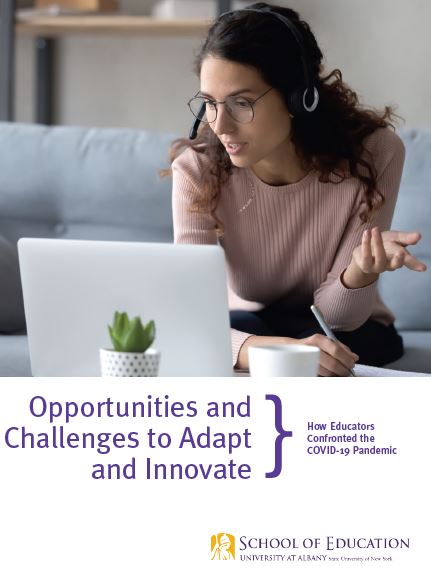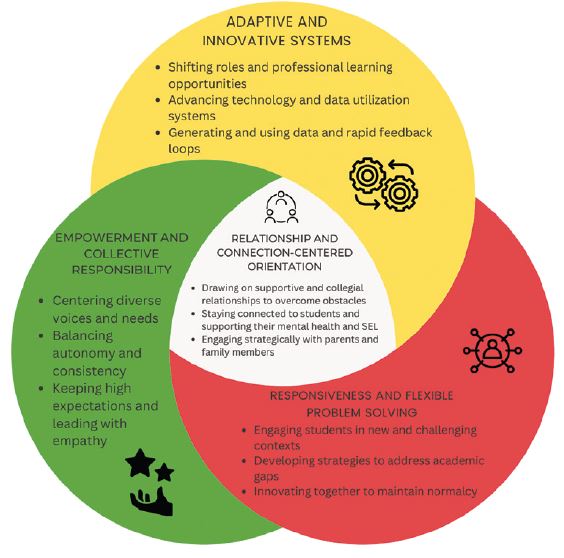NYKids Latest Study on Opportunities and Challenges to Adapt and Innovate: How Educators Confronted the COVID-19 Pandemic Now Available
by Kristen C. Wilcox, Maria I. Khan, Aaron Leo and Jessie Tobin
The NYKids team is pleased to announce that our latest report “Opportunities and Challenges to Adapt and Innovate: How Educators Confronted the COVID-19 Pandemic” is now available on our website.
As discussed in previous blogs, our primary goal for this study was to explore educators’ experiences during the pandemic and describe their adaptations and innovations.
 For this study we recruited six schools of 38 schools that participated in a survey exploring educators’ experiences of stress and job satisfaction during the pandemic.
For this study we recruited six schools of 38 schools that participated in a survey exploring educators’ experiences of stress and job satisfaction during the pandemic.
We selected these six schools because educators in them reported less severe increases in stress and job dissatisfaction and also because they represented a range of community characteristics and demographics.
The six participating schools in this study were:
Whitesboro Middle School Campus
Full case studies of the six schools that participated in this study are available on our website.
Four Drivers for Adaptation and Innovation
In this study, we conducted interviews and focus groups with 88 educators across the 6 participating schools. We uncovered four drivers for adaptation and innovation common across these schools:
- Empowerment and Collective Responsibility
[The principal] is very good at listening to everyone’s ideas, getting all of us to think about what we’re doing, and giving us a lot of autonomy to address issues. (educator)
First, we found that school and district leaders fostered empowerment among a diverse array of stakeholders and promoted collective responsibility to manage challenges and innovate.
They did this by:
- Centering Diverse Voices and Needs;
- Balancing Autonomy and Consistency;
- Keeping High Expectations and Leading with Empathy
- Responsive and Flexible Problem Solving
 I’m not really a roadblock person. Like if there’s something in the way, you just find a different way to do it. (school leader)
I’m not really a roadblock person. Like if there’s something in the way, you just find a different way to do it. (school leader)
Second, educators developed responsible and flexible ways to address new and unprecedented challenges wrought by the pandemic.
They did this by:
- Engaging Students in New and Challenging Contexts;
- Developing Strategies to Address Academic Gaps;
- Innovating Together to Maintain Normalcy
- Relationship- and Connection-Centered Orientation
It’s not like this in other schools; this school is very close knit. We’re very supportive of each other. Lots of community outreach, and the parents are really involved. And the kids feel that. (teacher)
Third, we found that educators worked purposefully to maintain relationships with colleagues, students, and families throughout the pandemic.
They did this by:
- Drawing on Supportive and Collegial Relationships to Overcome Obstacles;
- Staying Connected to Students and Supporting their Social-Emotional Development;
- Engaging Strategically with Parents and Family Members.
- Adaptive and Innovative Systems
My grandchildren are in the neighboring district in a different county. And we’re [Whitesboro] miles ahead of them. Absolutely miles. Everything from counseling to . . . scholastics—everything. (teacher)
Our final theme describes the systems which educators developed to mitigate the various challenges of the pandemic.
They did this by:
- Shifting Roles and Professional Learning Opportunities;
- Advancing Data Capture and Utilization Systems;
- Adapting Essential Services and Community Asset Use.
Find More in the Complete Report
Our study offers several findings related to adaptation and innovation in the context of the COVID-19 pandemic that provide insight into the challenges faced by school districts as well as the promising adaptations and innovations such crises prompt.
For all of the details, see the full report here!
Stay tuned for more continuing dissemination of our research results and we invite you to follow us on Twitter, Instagram, or Facebook, for announcements.
Please reach out to nykids@albany.edu if you have any questions or feedback about our research, or if you have interest in continuous improvement support using NYKids unique research-based processes and tools.
